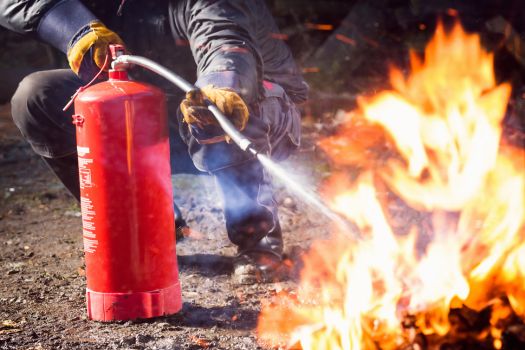Let’s talk about something we often take for granted—protecting your home from fire and protecting what matters most. Not because it’s Fire Safety Month. Not because it’s something that “should” be done. But because, as a homeowner or soon-to-be one, you’ve invested more than just money into your property. Your home represents effort, goals, peace of mind, and a future.
I’m Robbie English, Broker and REALTOR at Uncommon Realty, and I’ve been in this industry for decades. I’ve walked clients through high-stakes decisions, unexpected disasters, and yes—unfortunate fire-related losses. That’s why I want to help you take real, actionable steps today.
Fire doesn’t give you a warning. So, let’s make sure you’re not caught off guard.

TL;DR – How to Start Protecting Your Home From Fire Now:
- Fire safety isn’t seasonal—it’s a year-round responsibility worth taking seriously.
- Regular smoke and carbon monoxide alarm checks are your non-negotiable first step.
- Fire escape plans aren’t optional—they’re your insurance policy in action.
- Electrical cords, kitchen habits, and fire extinguishers are daily fire safety checkpoints.
- Robbie English and his team provide expert real estate guidance, with deep experience and care to help you in protecting your home from fire and protecting what matters most.
Where Fire Safety Starts—And Often Fails
It’s easy to assume you’re protected. You’ve got smoke detectors. Maybe you’ve even glanced at a fire extinguisher under the sink. But assumptions don’t stop fire. Awareness does. Action does.
Fire protection begins with your awareness. Awareness of your environment, your habits, and yes—your complacency. You can’t afford to be reactive when it comes to flames. Fires move fast. Seconds count. So we’re not going to give you a list of shoulds. We’re going to talk through what actually works—clearly, realistically, and from my experience as someone who’s been in real estate long enough to know where people drop the ball.
Smoke and Carbon Monoxide Alarms: First Line of Defense
You probably already have them. But do you trust them?
It’s not about having alarms—it’s about relying on them in a moment when panic takes over. That means testing them. That means knowing exactly where they are. And yes, that means checking the batteries more than once a year if your environment demands it.
Have you ever been mid-cooking, set off the alarm, and pulled the batteries just to get some peace? Most people have. But it’s what happens after that’s critical. If the battery stays out—or you forget to replace it—you’ve unintentionally disarmed your first defense.
Don’t do that. Check every unit. Replace them every 10 years, or sooner if your manufacturer’s instructions call for it. And make sure you’re not relying on a single alarm for the entire house. Different rooms, different risks. Protect them all.
Fire Escape Plans: They Aren’t Just for Kids
You might remember doing a fire drill in school, but when was the last time you practiced one at home?
Most people don’t have a real fire escape plan. They assume they’ll “figure it out” if something happens. That’s a dangerous mindset. Protecting what matters most means not leaving it to chance.
Start with this: if you were woken up by a fire alarm at 2 a.m., do you know which direction to go? Which door to avoid? Who you’d need to check on first?
Now take that thought further—does everyone in your home know that too?
Walk through your home. Identify clear, safe exits from every room. Choose a reliable outdoor meeting spot. And rehearse it. It may feel silly. Do it anyway. When you’re shaken by smoke or sirens, muscle memory matters more than logic.
Electrical Safety: Small Things Cause Big Fires
You don’t need to be an electrician to prevent electrical fires. You just need to look.
Frayed cords. Loose plugs. That overloaded power strip behind your TV that’s powering eight devices. These things may seem harmless until they aren’t.
Electrical fires often start silently. There’s no open flame. No warning. Just heat, time, and vulnerability. If cords are worn or outlets feel warm, stop using them. Immediately.
And this part’s key—don’t cover extension cords with rugs. It’s one of the most common mistakes homeowners make. The insulation wears down. Heat builds. A fire starts while you’re out to dinner.
Get rid of damaged cords, use surge protectors, and never ignore flickering lights. That flicker could be your warning shot.
Kitchen Fires: The #1 Danger Zone in Your Home
Here’s where most home fires begin—your kitchen.
You don’t need to be a master chef to cause a blaze. In fact, most fires happen not from cooking disasters, but from distractions.
Start by staying put. Never leave your stove unattended when using high heat or oil. If you need to leave the room, turn the burner off. Yes, even if it’s just “for a second.”
Towels. Paper. Curtains. These things should never be near open flames or heating elements. Keep them at least a few feet away.
Turn pot handles inward. It sounds like such a minor thing, but it can prevent a spill that becomes a fire. It also keeps children or guests from accidentally knocking something off a hot surface.
And keep a lid nearby when frying. If flames flare, don’t use water—just smother the fire by covering the pan.
Fire Extinguishers: Having One Isn’t Enough
How many fire extinguishers are in your home? One? Maybe two?
Do you know where they are right now?
Having extinguishers is great. But they’re useless if you don’t know how to use them—or can’t get to them in an emergency.
Make sure every extinguisher is rated for home use (Class A, B, and C) and that it’s fully charged. You’ll see this on the pressure gauge—it should be in the green zone. Check this every few months.
Place them where they’re needed most—kitchens, garages, near fireplaces. And run a quick review with everyone in the house. The P.A.S.S. method (Pull, Aim, Squeeze, Sweep) is simple and could save lives.
Beyond Safety—Why This Matters in Real Estate
Here’s where it gets real. As a REALTOR and Broker with decades of experience, I’ve seen the aftermath of fires. Not just the damage—but the disbelief. The grief. The loss of control.
When clients work with me and my team at Uncommon Realty, we don’t just focus on buying or selling. We go deeper. We talk about long-term safety. About smart upgrades. About being proactive in protecting your home from fire and ensuring you’re protecting what matters most.
This is the difference between working with just any agent and choosing to work with someone like me—someone who teaches other agents across the country, speaks nationally on real estate strategy, and has made it their mission to improve the client experience from every angle.
Real estate isn’t just a transaction. It’s a commitment. It’s about foresight. And that’s exactly what fire protection requires.
 Why You Should Trust Robbie English
Why You Should Trust Robbie English
Let’s be honest. You have options when it comes to hiring a real estate agent.
But not all agents are equal.
With me, you’re working with someone who has purposefully mastered this business—not just to close deals, but to empower clients. I teach the very agents you see on billboards how to do this work right. I’ve spoken at national conferences, developed training programs, and invested years into understanding every nuance of real estate.
And because I’ve seen what happens when safety is overlooked, I include discussions like this—about fire preparedness and property protection—as part of my ongoing commitment to client success. Whether you’re buying your first home or your fifth, I provide the insights that make a difference.
When you hire my team, you gain not just access to homes—but access to strategy, insight, and protection for the things that matter most to you. We help you navigate inspections, identify potential fire risks, and connect with trusted professionals who can help secure your property well beyond the closing table.
Protecting your home from fire isn’t a separate conversation. It’s part of how we protect your entire real estate experience. It’s part of protecting what matters most.
The Next Steps You Should Take—Starting Today
If you’ve read this far, I hope it’s clear: Fire prevention is your responsibility, but you’re not in it alone.
Walk through your house. Test those alarms. Rehearse that escape plan. Check your outlets. Take a look under the sink. Is your fire extinguisher where it needs to be? Charged?
Then, if you’re buying or selling—or even just thinking about how to make your home more secure—reach out to me. Let’s make your next move safer, smarter, and more strategic.
Because protecting your home from fire is more than just a checklist. It’s a commitment. And when you work with me, that commitment is shared.
I’m Robbie English with Uncommon Realty. I help you protect what matters most. And I’d be honored to help you next.






Leave a Reply